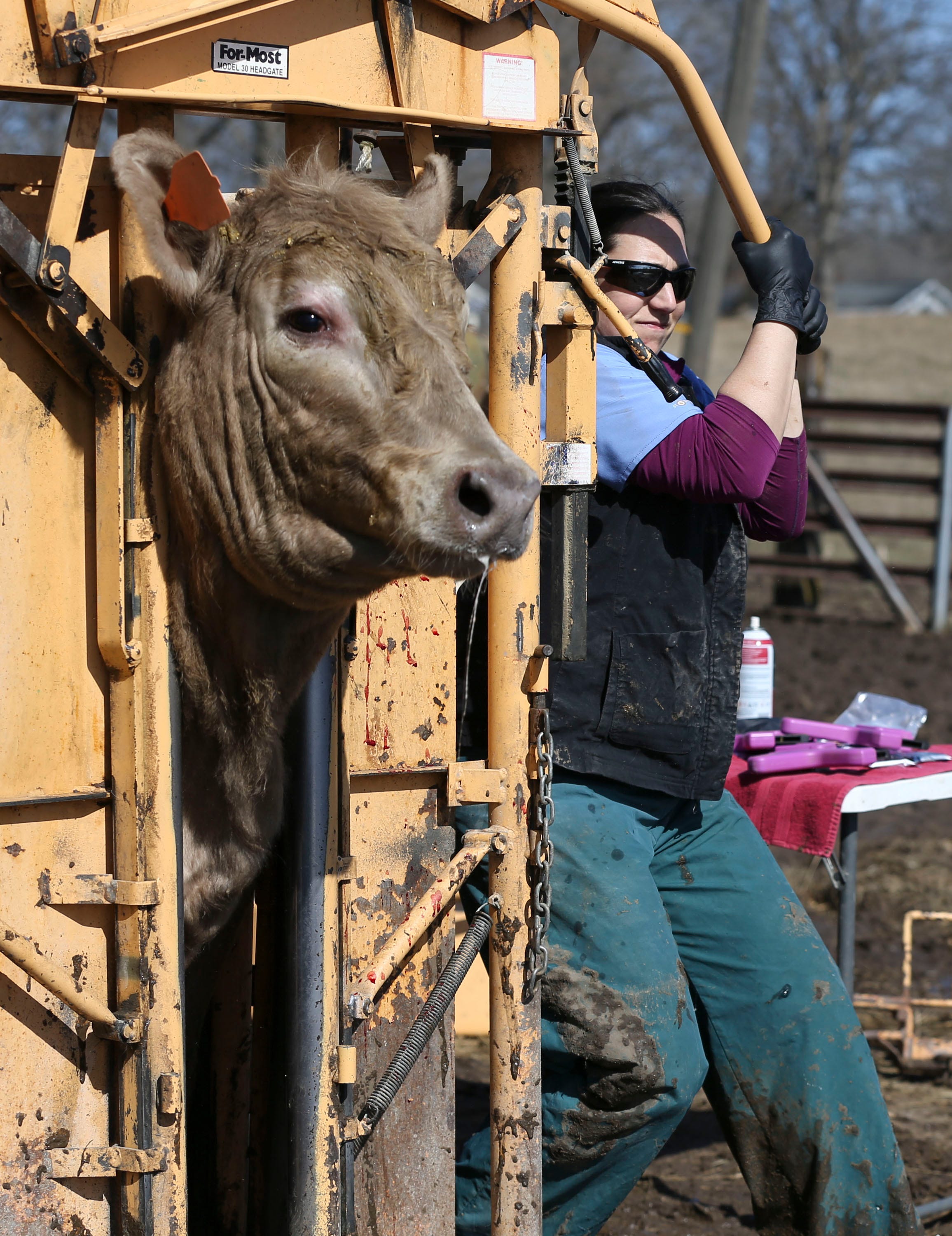Female veterinarians say gender disparity remains an uphill battle
 Colleen Kottke
Colleen Kottke
This is the fourth in a four-part series, “On Call: Vets Under Stress”, that explores the pressures and overwhelming challenges facing those who choose a career in providing care for our animals.
In 2009, the American Veterinary Medical Association reported that female veterinarians outnumbered their male counterparts for the first time. While they make up more than half of the veterinarians in the industry today, a culture of masculinity still exists.
According to a study conducted by Lancaster University Management School and Open University Business School, female practitioners say gender discrimination remains an uphill battle.
“Many of the women we spoke to, especially those in their early career, reported experiences of clients – or even in their own practices – treating them as having limited competence and credibility..." co-author Professor David Knights of Lancaster University said.
Al Martens who has worked in a large animal practice in eastern Wisconsin for 43 years said many women starting out in the field with him faced many challenges.

"Women have really had a tough road. They had to be pioneers, in that they had to prove themselves more than the men," Martens said.
In areas of the state considered agriculturally dense, Martens says its common to have large animal practices staffed with more than one female veterinarian.
"If you get up in the rural areas where there's not a lot of farms, there may be a lot of farmers that haven't experienced a female veterinarian," he said.
Pulling their weight
Meg Mueller was fortunate that after graduating from the University of Wisconsin School of Veterinary Medicine in 2010, she returned to western Wisconsin where many of her clients already knew her.
But as the "new" vet at Osseo-Augusta Veterinary Clinic, she still had to make the grade out in the field.
"The tough part is you need to prove that you're going to be a good doctor. But you shouldn't have that connotation behind it that you're a 'female' and you have to work that much harder," Mueller says. "Thankfully my co-worker Dr. Linda Giese who has been practicing for over 20 years went through those trenches of gender disparity so that those of us that came after haven't had to fight as hard. But it's still out there."
Today three of the four veterinarians that staff Mueller's mixed animal practice are women.
Mueller says one of the biggest challenges that females face in large animal practices is the issue of working with very strong and powerful patients in - much of the time - nonclinical, less than ideal settings. And client's perception that they 'can't handle the job'.
"It's a very physically demanding job with some risk involved and some of those issues can come to light in those situations," Mueller said. "But sometimes you have to figure out what your strengths are both physical and mentally and be able to take those tasks at hand."
MORE: Many Midwestern communities suffer from veterinary clinic shortages
MORE: Rural vet practices challenged with investing in staff retention
MORE: Veterinarian grads struggle to pay off student loans in rural areas
MORE: Alarming suicide rates reflective of stresses felt by veterinarians
Gender discrimination
Although gender doesn't play a role in how well a veterinarian performs a surgery on a DA (twisted stomach) or diagnoses hypocalcemia, if left unchecked, it can factor how a client interacts or trusts the opinion of the veterinarian.
One female veterinarian told Lancaster University researchers that a client demanded a male veterinarian come out to her farm because the woman was unhappy with the treatment that the female veterinarian had delivered – even though the male vet did the same thing.
Veterinarian Katie Mrdutt says that while farmers in her clinic's territory up in northwest Wisconsin had already been exposed to female veterinarians, she sensed the hesitancy when she arrived on the farm of a new client.

"My favorite part of those experiences was showing how I could use my brain to tackle challenges that maybe the client thought only could be done with brawn," Mrdutt said. "One particular client had a beef cow having difficulty calving. He had been working on her for a few hours before he called me and had not been making any progress."
Within 10 minutes of her arrival the calf was on the ground and alive.
"He was shocked at how quickly I fixed the problem, and probably more so because I was 8 months pregnant at the time," said Mrdutt.
Dual roles
Among the 75 veterinarians interviewed in the Lancaster University study, many felt that women practitioners were automatically presumed to be potential mothers, a perception that could be viewed as problematic for long-term careers.
One female equine veterinary professional told dvm360, a veterinary media organization, that during her interview to get into veterinary school, she was asked how long she planned to practice before starting a family. An older veterinarian intimated to her that it wasn't worth her time to invest her time and money in veterinarian school because she would eventually leave the profession in order to have a family.
Many veterinarians like Mrdutt and Stacey Adams, who is the sole practitioner and owner of her Lake Geneva area practice, have found a way to balance the demands of motherhood and a taxing career. Mrdutt left private practice after three years to join a non-profit that focuses on responsible drug use education among farmers and veterinarians.
Adams, who runs a small beef operation at home and is the mother of two children under 4, including one with special needs, says over the past 12 years she has learned to set boundaries between her personal and work life. This includes reserving after hours and weekend calls for emergencies only.
"If this costs me a potential client, then they probably weren't a client I wanted in the first place," Adams said. "Some clients want to say that I only feel that way because I'm a woman, but I say it is because I value my family and my health."
Surprisingly the clients that have been most judgmental about her boundaries and family needs have been women. She recalls a time when her special needs son then 2, had to be admitted to a hospital 95 miles from their home for a severe respiratory infection.
During this health crisis, Adams received a call from a non-client who had a sick goat. Adams relayed she was unavailable and supplied the woman with two other clinics to call.

"She had the audacity to tell me that she had never had a veterinarian put a child before an animal and that I needed to re-evaluate my career choice if I felt my child was more important than her goat," Adams said. "I told her that any veterinarian can take care of her goat but only I can hold my son and comfort him when he is crying for his momma in the hospital."
Mrdutt says most farmers were welcoming when on more than one occasion she had to bring her child along on calls.
"Usually the farmer had more fun with him and forgot about assisting me," she laughed. "The beauty of working with some clients is that they get to know you and understand the challenges we face, especially balancing the demands of afterhours care."
Afterhours calls to an unfamiliar farm late at night may put a lone female veterinarian in a vulnerable situation. While Mueller has been fortunate to have a good working relationship with her clientele, some of her friends haven't been so lucky.
"I have classmates that have been in some pretty bad situations. No one deserves to go to work and be put in a position like that," Mueller said. "And it's hard because we're out on the road by ourselves, and then there's the call in the middle of the night for that client that you don't really know. That can be daunting."
Bridget Heilsberg, equine veterinarian, owner of Crown 3 Veterinary Services in Whitesboro, Texas, and president of the Women's Veterinary Leadership Development Initiative told dvm360 that safety on farm calls is a regular discussion for the women in a Facebook group she's part of.
Solutions range from traveling with a canine companion to calling friends, coworkers or loved ones before visiting a new client—even to carrying a firearm for protection.
"I personally not only have a firearm but I also have a German shepherd, and I travel with her to my farm calls," Heilsberg says. "I feel like it's an additional concern that women have because we have that concern in our everyday lives. Then it gets amplified when we go out on a farm call visit with someone we don't know."
A ways to go
Mueller says it's important for a veterinarian's colleagues and their clients to respect their need to find a healthy work-life balance.
"I think in the profession it still comes down to a respect factor if a woman chooses to both work and have a family or needs to pull back and not work as much," she said. "I'd like to think that we've come a long way, but we still have a long way to go in addressing those gender disparities across the industry, whether that be pay or the respect factor."
A study from Cornell University researchers that surveyed 2,760 veterinarians discovered a pronounced wage gap between male and female veterinarians, especially among recent graduates and top-earning practitioners.
The study, published in the March 15 issue of the Journal of the American Veterinary Medical Association, found that among the top quarter of earners, men were paid about $100,000 a year more.
While reasons for the wage gap were not identified, researchers noted that factors could include unconscious bias, size and type of practice and societal expectations.
Their analysis showed that type of ownership was instrumental in earnings. Partnerships were believed to be more beneficial for womens' income earning potential than sole proprietorships, while any form of ownership benefits men’s incomes. When it comes to the number of years worked, the study found that men move into higher income brackets at lower levels of experience than women.

Martens says female veterinarians on staff at Waupun Veterinary Service pull their weight the same as their male counterparts. He says that veterinarians - regardless of gender - that display a good attitude, strong work ethic and contribute to the practice are rewarded.
"This culture goes back to the guy that hired me. We try to make everyone a partner to make it economically feasible," he said.
Know your worth
Mrdutt says gender disparity and crushing student debt load, added to the strain on mental health from long hours and demanding clients and compassion fatigue, makes veterinarian medicine a hard profession for women to work in some days.
"I had my mind set on being a veterinarian since I could walk and talk, and I do love a challenge," Mrdutt said. "I'd tell any young woman considering this profession to know their worth. Know what you want and don't want, and that it's ok to take care of you first. Finally, know that you are more than capable."
Adams says she has never let being a woman hold her back in her profession.
"I have always been of the opinion that if you do your job and you do it well, people will respect you for it," she said. "Those who don't are people that you don't want for clients anyway. Those are the people who are going to take advantage of you and will never be happy no matter how much you do for them."